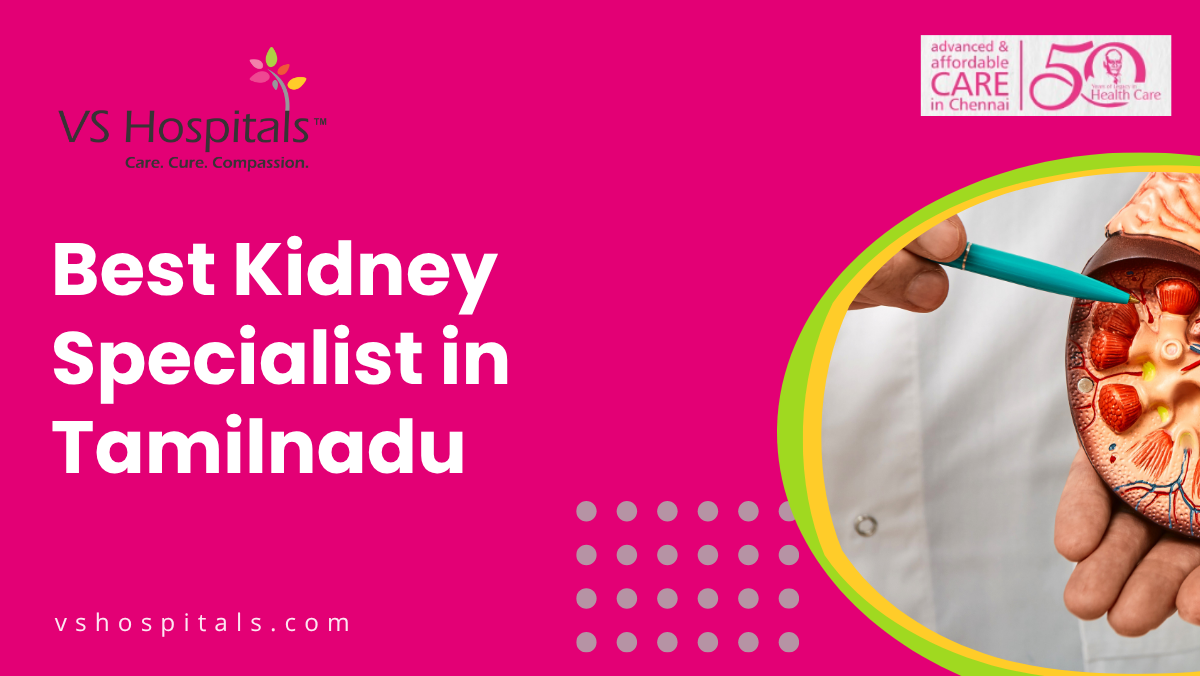Advanced Clinical Nephrology for Kidney Health
Comprehensive clinical nephrology care for kidney diseases, including diagnosis, treatment, and management of chronic kidney conditions with expert specialists.

Clinical Nephrology is the branch of medicine that focuses on diagnosing, managing, and treating diseases related to the kidneys. The kidneys play a vital role in filtering waste, balancing electrolytes, and maintaining overall fluid balance in the body. Any malfunction in these organs can lead to severe complications like hypertension, fluid retention, or even kidney failure.
At VS Hospitals, Chennai, the Department of Clinical Nephrology provides expert care for patients with both acute and chronic kidney disorders. With a team of leading nephrologists, advanced dialysis technology, and state-of-the-art intensive care units, VS Hospitals ensures that every patient receives the highest standard of renal care. The hospital’s patient-centered approach emphasizes early detection, preventive strategies, and long-term management for kidney health and overall well-being.
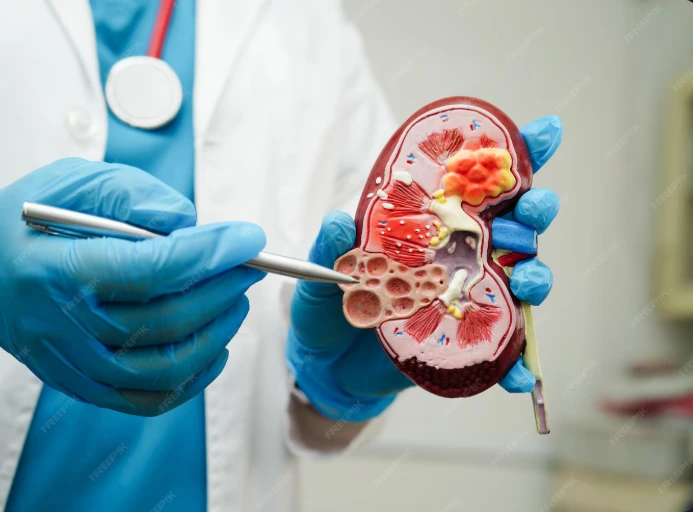
Early Detection Saves Lives
Early detection and treatment are crucial for improving the chances of survival. If you notice any concerning symptoms, consult a healthcare provider immediately.
Signs and Symptoms
Swelling (Edema)
Puffiness around the eyes, ankles, or feet caused by fluid retention.
Changes in Urination
Reduced urine output, frequent urination at night, or foamy urine indicating protein loss.
Fatigue and Weakness
Due to the accumulation of toxins in the blood, leading to anemia and tiredness.
Shortness of Breath
Caused by fluid buildup in the lungs when kidney function declines.
Loss of Appetite
Common in patients with advanced kidney disease due to toxin accumulation.
Nausea and Vomiting
Occurs when waste products are not efficiently filtered.
High Blood Pressure
Both a cause and a consequence of kidney dysfunction.
Blood in Urine
Hematuria - pink, red, or dark urine, the most common symptom
Frequent Urination
Feeling the need to urinate frequently, even when bladder is not full
Painful Urination
Experiencing pain or burning sensation while urinating
Back or Pelvic Pain
Pain that occurs as the cancer grows and spreads
Unexplained Weight Loss
Significant weight loss not related to diet or exercise
Fatigue
Feeling unusually tired or weak without a clear cause
Meet Our Expert Clinical Nephrology
Risk Factors
Smoking
Smoking is one of the leading causes of bladder cancer. Chemicals in tobacco smoke can damage the lining of the bladder, increasing the risk.

Gender
Men are at a higher risk of developing bladder cancer than women.

Chronic Bladder Infections or Inflammation
Conditions such as bladder infections and long-term bladder inflammation can increase the risk.

Exposure to Chemicals
Prolonged exposure to certain chemicals, especially those used in the dye industry, rubber production, and chemical manufacturing, increases the risk.

Diabetes Mellitus
The leading cause of chronic kidney disease due to uncontrolled blood sugar levels damaging kidney filters.
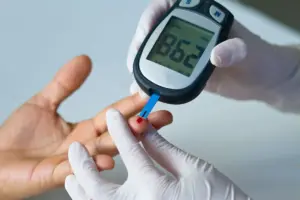
Hypertension
High blood pressure injures blood vessels in the kidneys, reducing their filtering capacity.
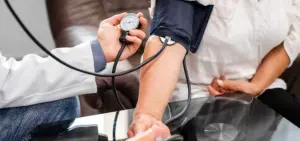
Family History
Genetic predisposition to polycystic kidney disease or other inherited renal disorders.

Obesity
Excess body weight strains the kidneys and increases the risk of diabetes and hypertension.

Smoking
Reduces blood flow to the kidneys and accelerates kidney damage.

High Cholesterol Levels
Leads to atherosclerosis, reducing kidney perfusion.
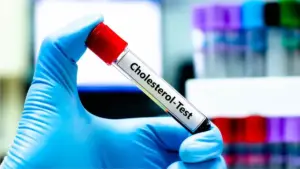
Frequent Use of Painkillers (NSAIDs)
Long-term use harms kidney tissues.

Dehydration and Infections
Recurrent urinary tract infections or kidney stones can lead to chronic damage.

Older Age
Kidney function gradually declines with age, increasing vulnerability to chronic diseases.

Advanced Cancer Treatment Options
Diet and Nutrition
Prevention
Diagnosis
Key Services
Key Facilities
A kidney-friendly diet plays a vital role in controlling symptoms and slowing the progression of renal disease. The dietitians at VS Hospitals tailor nutrition plans for each patient based on their condition, treatment stage, and lab results.
- Limit salt intake: Reduces fluid retention and blood pressure load on the kidneys.
- Control protein consumption: Small portions of lean protein such as eggs, fish, or tofu prevent overworking the kidneys.
- Choose fresh fruits and vegetables: Focus on low-potassium options like apples, grapes, and cabbage.
- Avoid processed foods: Packaged items contain hidden sodium and phosphorus that can harm kidney health.
- Stay hydrated: Adequate water intake helps flush out toxins, unless restricted by the physician.
- Monitor phosphorus and potassium: High levels can cause bone weakness and heart complications.
- Limit dairy and red meat: To prevent excessive waste product buildup.
- Prefer whole grains: Millets, brown rice, and oats support energy without straining filtration.
At VS Hospitals, nutritionists work closely with nephrologists to design diet charts that complement dialysis, transplant, or medication-based treatment plans for optimal results.
Prevention is the best way to combat kidney disease. VS Hospitals emphasizes lifestyle changes, awareness, and early diagnosis as key strategies for preserving kidney health.
- Control blood sugar: Regular monitoring and medication adherence for diabetic patients.
- Manage blood pressure: Keep readings below 130/80 mmHg to protect the kidneys.
- Stay physically active: Exercise 30 minutes daily to improve circulation and reduce obesity.
- Avoid excessive painkillers: Use NSAIDs and over-the-counter medicines only when prescribed.
- Quit smoking and alcohol: Reduces oxidative stress and improves blood flow to the kidneys.
- Eat a balanced diet: Reduce salt, sugar, and fat intake to maintain metabolic health.
- Get annual kidney check-ups: Early screening for creatinine, urea, and urine protein levels.
- Stay hydrated: Maintain good fluid balance unless medically restricted.
The Clinical Nephrology Department at VS Hospitals runs preventive health programs and educational sessions to promote kidney wellness in the community.
Accurate and early diagnosis is crucial for effective management of kidney disorders. VS Hospitals, Chennai, uses advanced diagnostic technologies to evaluate kidney function precisely and detect diseases at the earliest stage.
Diagnostic Procedures Include:
- Comprehensive Medical History: Detailed review of patient symptoms, lifestyle habits, medications, and family history of kidney diseases.
- Physical Examination: Assessment of blood pressure, swelling in legs or face, and signs of fluid retention or dehydration.
- Laboratory Investigations: Blood tests to measure creatinine, urea, and electrolyte levels for kidney function evaluation.
- Urine Analysis: Examination of urine for protein, blood, or infection to detect kidney damage or urinary tract disorders.
- Imaging Studies: Ultrasound, CT scan, or MRI to visualize kidney size, structure, and detect blockages or stones.
- Kidney Biopsy: A small tissue sample is analyzed to confirm specific kidney diseases such as glomerulonephritis or nephrotic syndrome.
- Glomerular Filtration Rate (GFR) Test: Estimates how well the kidneys are filtering waste from the blood.
Each diagnosis at VS Hospitals is supported by a multidisciplinary review involving nephrologists, radiologists, and pathologists to ensure accuracy and precision in care planning.
The Clinical Nephrology Department at VS Hospitals offers an extensive range of medical and surgical services designed to address every aspect of kidney health from prevention and diagnosis to advanced treatment and post-care rehabilitation.
Comprehensive Services Include:
- Chronic Kidney Disease (CKD) Management – Early detection, monitoring, and long-term treatment for CKD patients.
- Acute Kidney Injury (AKI) Treatment – Rapid diagnosis and intervention to restore kidney function.
- Dialysis Services – Advanced hemodialysis and peritoneal dialysis for patients with renal failure.
- Hypertension and Diabetes Control – Managing conditions that affect kidney health.
- Electrolyte Imbalance Correction – Treatment for sodium, potassium, and calcium abnormalities.
- Glomerular and Tubular Disorders – Diagnosis and therapy for complex nephritic and nephrotic conditions.
- Kidney Biopsy and Evaluation – Accurate tissue-based diagnosis for targeted treatment.
- Pre and Post Kidney Transplant Care – Continuous care for transplant patients to ensure graft health and recovery.
- Preventive Nephrology Programs – Screening and education to prevent kidney diseases.
VS Hospitals ensures that every patient receives evidence-based, individualized treatment aimed at improving kidney function and overall well-being.
VS Hospitals, Chennai, stands among the top healthcare centers in Tamil Nadu for its world-class nephrology infrastructure and compassionate patient care.
Advanced Diagnostic and Treatment Facilities include:
- Modern Dialysis Unit: Equipped with state-of-the-art hemodialysis and peritoneal dialysis systems.
- 24/7 Laboratory Support: Comprehensive renal function and electrolyte testing available round the clock.
- Ultrasound and Imaging Suite: High-resolution imaging for accurate kidney assessment.
- Renal Biopsy Facility: For precise diagnosis of complex kidney disorders.
- Critical Care Support: Dedicated nephrology ICU for managing acute renal failure.
- Transplant Evaluation Unit: Pre- and post-kidney transplant assessment and follow-up care.
- Specialized Hypertension Clinic: Focused management of blood pressure related to kidney disease.
- Diet and Nutrition Counseling: Personalized renal diet plans for optimal kidney health.
- Outpatient and Inpatient Services: Continuous monitoring and expert nephrology consultations.
- Patient Education Programs: Guidance on kidney care, dialysis maintenance, and lifestyle management.
The hospital’s patient-centric approach and advanced nephrology care protocols ensure optimal recovery, safety, and long-term kidney health.
Top Medical Facilities at Our Multispeciality Hospital – Here’s What Makes Us Different!
Ready to Begin Your Clinical Nephrology Care Journey?
Learn More About Clinical Nephrology
Frequently Asked Questions
VS Hospitals is equipped with advanced dialysis units, expert nephrologists, and state-of-the-art diagnostics. Its multidisciplinary approach ensures early detection, personalized treatment, and long-term kidney care, making it one of Chennai’s most trusted nephrology centers.
The frequency of dialysis depends on the patient’s condition and kidney function. Most chronic kidney disease patients undergo dialysis two to three times a week. VS Hospitals’ specialists customize each treatment plan for maximum safety and comfort.
Yes. VS Hospitals provides complete pre-transplant evaluation, donor matching, surgery coordination, and post-transplant follow-up. A team of nephrologists, urologists, and dietitians ensures smooth recovery and lifelong renal health management.


